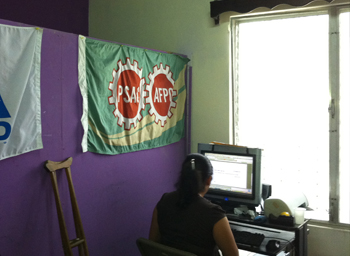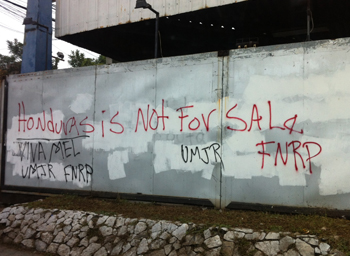
The last few days have been very exciting and I feel like I have learned so much already. We have been staying busy from morning until night, so it has been somewhat physically, mentally, and emotionally draining.
We have met with a variety of groups, including students from the socialist resistance movement, human rights lawyers from the Association of Judges for Democracy, and with CODEMUH (Collective of Honduran Women), who work to promote labour rights for women who work in maquilas (sweatshops).
The meetings we had with CODEMUH made a huge impact on me. We sat down with a group of maquila workers who described the experience of working in a maquila, where they sewed clothes for multinational companies like Hanes. These women described working for long hours in cramped, unhealthy environment,s where they are pushed to meet their quotas of 400-500 dozen pieces of sewing per day. These women worked without breaks and one even described being reluctant to even turn her head around because of the second that this would cost her production.
Not surprisingly, the maquila workers suffer from a range of injuries and illnesses caused by the unsafe working environment, repetitive motion, and the indifference of the companies that they work for. One woman, Delsa, talked about saving money up in order to buy a cake for her only daughter's birthday; when she brought the cake out to serve, she dropped it on the floor because she can't feel her hands anymore due to the long years of working in the maquila.
These women cried as they talked about the years of labour which have left them with irreparable damage to their bodies. Often workers with health problems face discrimination in the maquila, or are fired if they are unable to produce enough. Part of CODEMUH's mission is to help these women understand and fight for the rights that they have. This non-profit organization also places pressure on the companies and the government to provide better protection for workers.
Hearing about the experiences of these women and the oppression they have endured has really made me think about the importance of solidarity and fighting to protect the rights of the poor and working class. This experience also emphasized the need for education and awareness about the working conditions that exist in Central America. I know that before coming on this trip I did not know or think about how my clothes were made, but now I am going to be conscious of this.
The first photo (above) is me at the CODEMUH office. Underneath their name it says "a place of caring". The second photo (below) shows the PSAC flag that they have proudly displayed in their office. The third photo (bottom) shows some interesting graffiti protesting the role of multinational corporations and the use of natural resources in Honduras.
-Rachel
Previous: First impressions


Topics:
Our Organization:
Provinces:
